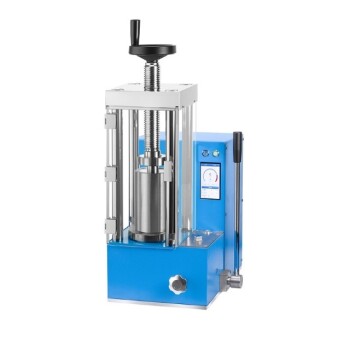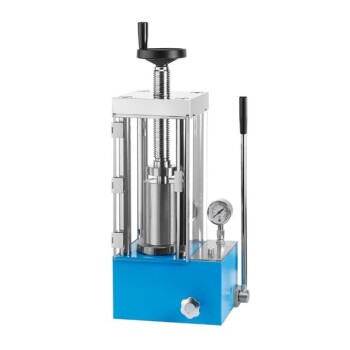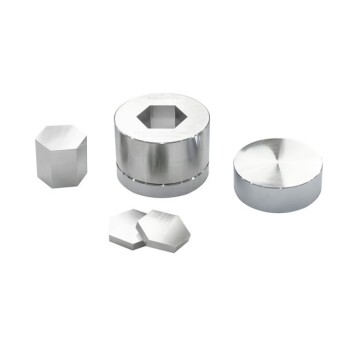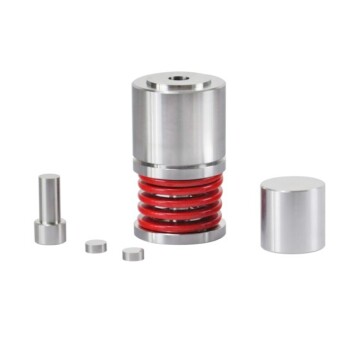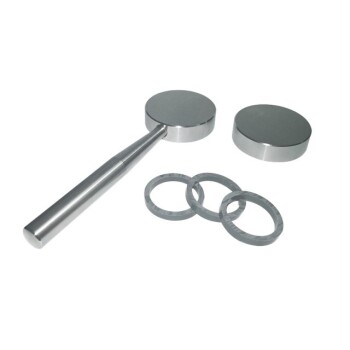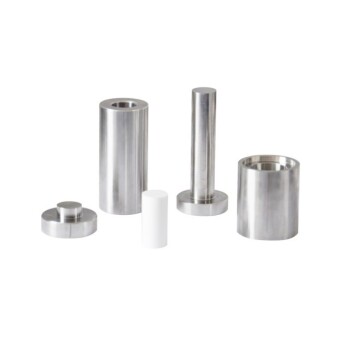In short, Cold Isostatic Pressing (CIP) is a powder metallurgy process used to consolidate a wide and versatile range of materials. The primary candidates are powdered metals, advanced ceramics, cemented carbides, refractory materials, graphite, plastics, and even some composites. The key unifying factor is that the starting material must be in a powder form.
The core principle of CIP is its ability to uniformly compact powders into a dense, solid "green" part. This makes it an ideal preparatory step for any material that begins as a powder and requires high, consistent density before a final strengthening process like sintering.
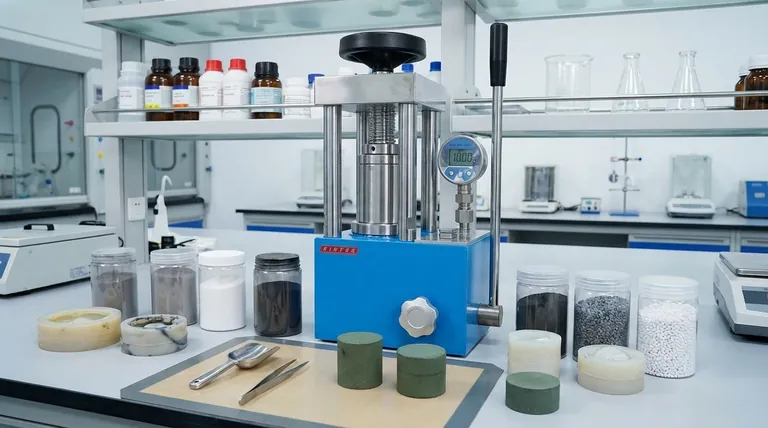
The Principle Behind CIP Material Selection
To understand which materials are suitable, you must first understand the process itself. CIP is not about shaping a solid block; it's about consolidating a loose powder into a cohesive, high-density mass.
The Starting Point: A Powder in a Mold
The process begins by placing loose powder into a flexible, sealed container, typically made of an elastomer like rubber or polyurethane. This "mold" defines the initial shape of the part.
The Mechanism: Uniform Pressure
This sealed mold is then submerged in a liquid inside a high-pressure vessel. The liquid is pressurized, exerting equal force (isostatically) on every surface of the flexible mold. This uniform pressure compacts the powder inside.
The Result: A Dense "Green" Part
This process creates a part with highly uniform density, free from the internal stresses and density gradients common in other pressing methods. This compacted part, known as a "green" part, is solid enough to be handled but has not yet reached its final material properties.
A Breakdown of Key Material Categories
Because CIP is fundamentally a powder consolidation technique, its application spans across any industry that works with high-performance powdered materials.
Metals and Cemented Carbides
Powdered metals, hard metals, and cemented carbides are common candidates. CIP is used to create dense preforms that can then be sintered and machined into final components.
This is ideal for producing parts like high-performance metal filters or near-net shape preforms for complex industrial tooling, minimizing waste from machining.
Ceramics and Refractory Materials
Advanced ceramics, graphite, and refractory materials benefit immensely from CIP. The uniform density achieved is critical for preventing cracks and weaknesses during the subsequent high-temperature firing (sintering) stage.
Common applications include manufacturing ceramic insulators, crucibles for molten metal, and nozzles for high-temperature industrial processes.
Plastics and Composites
Certain polymers and composites in powder form can also be processed with CIP. This is often used to create specialized components with uniform internal structures.
A primary example is the production of thick-walled plastic tubes or other complex polymer shapes that are difficult to achieve through traditional molding.
Understanding the Process Limitations
While versatile, CIP is not a universal solution. Understanding its limitations is key to using it effectively.
The "Green" State is Not the Final State
The part that emerges from the CIP process is a "green" compact. It has high density but low strength. It almost always requires a secondary thermal process, like sintering, to fuse the powder particles together and achieve the final desired mechanical properties.
Material Must Be in Powder Form
CIP is exclusively a powder consolidation method. It cannot be used to shape or densify solid blocks of metal, ceramic, or plastic. The material must be able to flow and compact under pressure.
Tooling and Cycle Time
The flexible molds have a limited lifespan and must be designed for the specific part geometry. While highly effective, CIP can have longer cycle times compared to uniaxial pressing, making it better suited for high-value components rather than mass-produced, simple parts.
Making the Right Choice for Your Application
Selecting a material for CIP depends entirely on the performance requirements of your final component.
- If your primary focus is extreme hardness and wear resistance: Cemented carbides and hard metals are your ideal candidates for creating tooling and cutting components.
- If your primary focus is high-temperature stability and electrical insulation: Advanced ceramics and refractory materials provide the best performance for parts like crucibles and insulators.
- If your primary focus is creating complex metal shapes with minimal waste: Powdered metals allow you to produce intricate preforms that are very close to the final desired shape.
- If your primary focus is a uniform polymer structure: Powdered plastics can be used to form dense, homogenous components like specialized tubes or blocks.
Ultimately, CIP empowers engineers to create high-integrity components from a vast array of advanced powdered materials that would be difficult or impossible to form otherwise.
Summary Table:
| Material Category | Key Examples | Common Applications |
|---|---|---|
| Metals and Cemented Carbides | Powdered metals, hard metals, cemented carbides | High-performance filters, tooling preforms |
| Ceramics and Refractory Materials | Advanced ceramics, graphite, refractories | Insulators, crucibles, nozzles |
| Plastics and Composites | Polymers, composites in powder form | Thick-walled tubes, complex shapes |
Need precise powder consolidation for your lab? KINTEK specializes in lab press machines, including automatic lab presses, isostatic presses, and heated lab presses, designed to handle materials like metals, ceramics, and plastics with uniform density. Enhance your laboratory's efficiency and part quality—contact us today to discuss your specific needs and discover how our solutions can benefit your projects!
Visual Guide
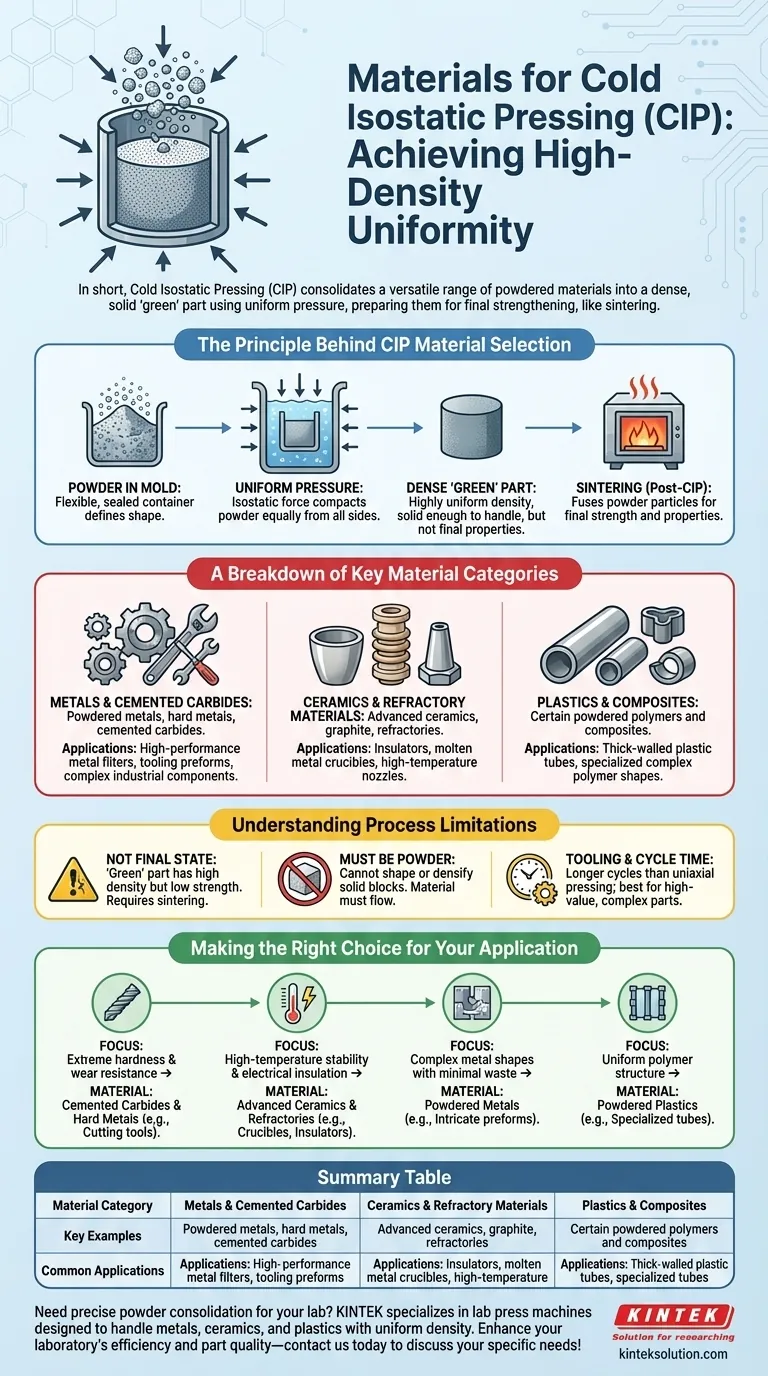
Related Products
- Electric Lab Cold Isostatic Press CIP Machine
- Electric Split Lab Cold Isostatic Pressing CIP Machine
- Manual Cold Isostatic Pressing CIP Machine Pellet Press
- Automatic Lab Cold Isostatic Pressing CIP Machine
- Lab Polygon Press Mold
People Also Ask
- What are some examples of applications for cold isostatic pressing? Boost Your Material Performance with Uniform Compaction
- What are the characteristics of the isostatic pressing process? Achieve Uniform Density for Complex Parts
- What is the standard procedure for Cold Isostatic Pressing (CIP)? Master Uniform Material Density
- What are the standard specifications for Production Cold Isostatic Press Systems? Optimize Your Material Compaction Process
- What industries benefit from Cold Isostatic Pressing technology? Ensure Reliability in Aerospace, Medical, and More
